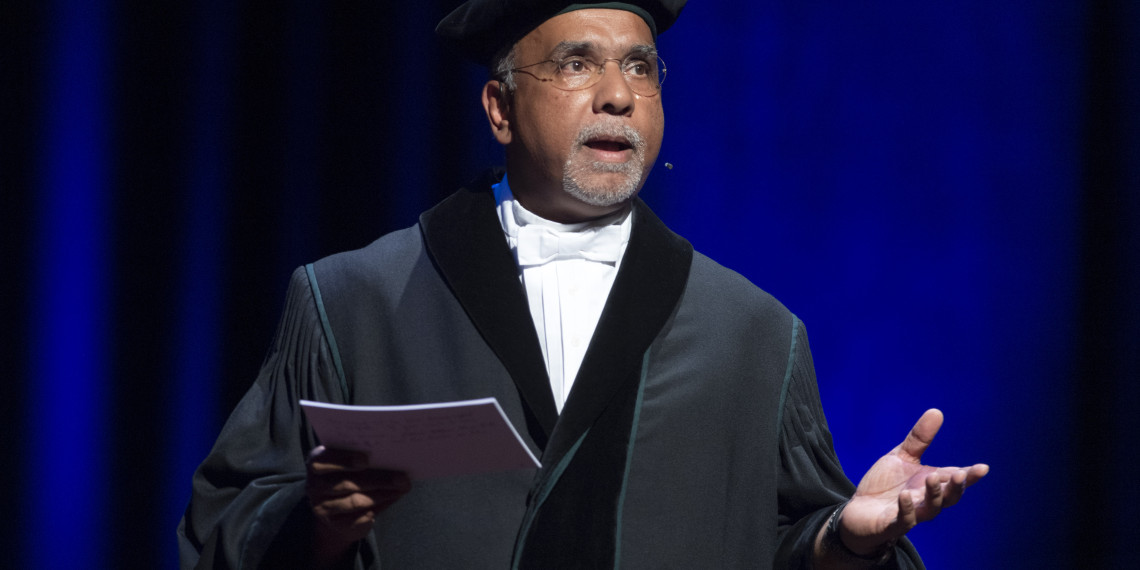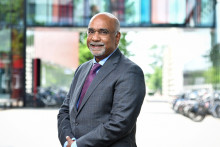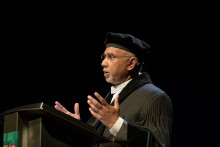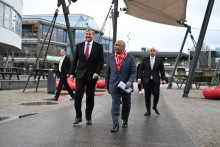You have just returned from the visit of Minister Eppo Bruins, how was that?
'The minister visited our region, a few labs at the UT and then went to Saxion. I think we were able to show him what we are good at; excellent education and research and cooperation in the region. By which I mean: the collaboration between the UT, Saxion, the ROC and the industry. Bruins sees that we are important players, but also that we educate them. If you look at ASML, for example, and who was partly responsible for the success of that company, there are a lot of UT alumni among them. I'll just mention names like Jos Benschop and Martin van den Brink.'
How did you experience the past academic year?
'It was a tough year, very tough. And that applies to many things that happened; around internationalisation, budget cuts, politics. Everything that made it necessary to intervene and make decisions that affect people.'
Does it affect you too?
'It certainly has taken its toll on me. It's also not like I close the door behind me here in the evening and then leave it behind me. That's not how it works for me. I am a people person. I also slept badly last year. A lot keeps grinding in my head. You get up with it, and you go to bed with it.'
How do you stay fit and sharp despite this? After all, there is a university to govern?
'I try to find balance. I no longer have my own laboratory, but I do have a kitchen. So I often cook, that's my form of relaxation. I also like to read. And fortunately I can talk well with my wife and daughter.'
Were there any bright spots this academic year?
'There are always bright spots. Like today; I see young people passionately working in the lab during such a working visit by the minister. I heard a ROC student – he works together with Bram Nauta's research group – talk about a brand new measuring device that performs much less well in certain respects than an old analogue design. Wonderful, that enthusiasm of that student. I just think that's – eh say – cool. But there were more beautiful things this year. Like Detlef Lohse joining the Royal Society and the nomination of the CLEAR project for the Dutch Education Award.'
Still, do the lows prevail?
'As the Executive Board, we have indeed had to make decisions that had a lot of impact on people.'
You are referring to the reorganisation at the Faculty of Science & Technology?
'That was definitely a low point this year. It also affected my own group, and that is a hard blow. But one director should not sit in the seat of another director either, you have to guard your role purity at all costs. I know that what I say can sometimes have a lot of impact, in my role as President of the Executive Board. So sometimes you have to choose your words extra carefully. Sometimes I react secondarily, but that's because I quickly become passionate.'
'I know that I am not in the shoes of those affected. But I do think I can offer them a listening ear and advice'
Did you receive many reactions from worried employees or employees threatened with dismissal?
'Yes, and that was sometimes difficult...'
Did you talk to them?
The president of the Executive Board is silent for a moment, becomes visibly emotional.
Subramaniam continues: 'Sometimes I shed some tears together with people. Because with some I have a more personal relationship – sometimes for twenty years – and then you share quite a lot with each other. And no, I can't not do it. It stems from involvement. I know that I am not in the shoes of those affected. But I do think I can offer them a listening ear and advice.'
In the introductory interview with U-Today as president of the Executive Board, you said that you wanted to learn every day. What did you learn in particular this academic year?
'My most pressing lesson is: keep communicating. Especially when things get difficult, you have to be honest, open and transparent. As a board, we constantly try to do this, because we see that we have to keep repeating the message about why our financial measures are taken. We tell it through newsletters, videos, but also with our 'Executive Board on Tour' sessions. I try to do that with a certain amount of gentleness and compassion, but it has to be done.'
As far as communication is concerned: we were asked why the Executive Board is still making cuts now that the cabinet has fallen?
'For the coming years, the cuts in higher education have already been booked in the national budget. The fall of the cabinet does not change that, and so we just have to deal with it. And as for a new cabinet; we are not there yet. Nothing will change for the 2027 national budget anyway. Take the previous minister, Robbert Dijkgraaf, as an example. As outgoing minister, he still implemented a number of things. So no, those cuts are not just gone with the fall of this cabinet. I am cautiously optimistic because of all the political developments, but it is far too early to celebrate. Let's not count our chickens before they hatch. We still have to see if there are actually changes coming.'
'Going back into science was not really an option anymore, I've been out for too long. Even though I do miss it'
You must have travelled to The Hague an incredible number of times in the past year to lobby for the interests of the UT?
'Of course, you do that lobbying in all kinds of contexts. For example, with the four technical universities, with the umbrella of universities UNL, or with organizations such as Twente Board and the region. But also together with Saxion and other knowledge institutions, to jointly advocate for the regions. So yes, there were a lot of conversations.'
Did those help in any way?
'I do know that it is very important to do; lobbying and networking. In this way, you try to give the region a voice in The Hague. In the past year I have called a lot; with mayors, the province, colleagues in the country. I think it took up about a third of my time. Because all those decisions in The Hague do determine the course of the university. Not immediately, but the course in two or three years and the years after that.'
This year you also decided to go for a second term. Did you have to think about this for a long time – due to the difficult phase the UT is in?
'All in all, I have been an administrator for about twelve years now, which includes my rectorship at the Vrije Universiteit and my period as director at AMOLF. I have thought about it thoroughly. Going back into science was not really an option anymore, I've been out for too long. Even though I do miss it. I also struggled with my health. But in the end, it was a conscious choice to continue. The work is not finished and above all, I get enormous satisfaction from creating an environment in which people can develop and pursue excellence in their own way. For that, I wanted to be in balance. Fortunately, I have that feeling more and more.'
'In times of growth – as we have had for years – the discipline sometimes sinks for a while'
You mention the word balance, the key word in the case of the university's financial situation seemed to be 'grip'. Do you have the impression that the UT now has that grip?
'What I see is that the measures are having an effect. The most recent management report looked good, but such a report is a prognosis. Moreover, it contains many incidental windfalls. Keeping your structural finances in balance, that's what you want to steer towards. Yes, it looks better than this time last year, but there is still work to be done. We certainly can't just let go of the measures.'
Because we still have enough coming our way?
'Certainly, if you consider that we want to have a budget without a planned deficit next year, while this year we want to record a deficit of at most one percent. Everything we do better this year is a bonus for next year. In the end, it's no different than at home, except for the scale: you have to have your books in order. That financial hygiene must be good. In times of growth – as we have had for years – the discipline sometimes sinks for a while.'
Is that financial hygiene now in order?
'It's a work in progress. What I mentioned earlier about the importance of communication applies just as much here. We still have to make sure that people understand why they have to take holidays and register them properly. That they understand why they have to write hours, because otherwise they will not be paid the research funding. These are all things that we must continue to be extremely alert to.'

Criticism that emerged during a meeting with support staff is the 'lack of a master plan' and a 'lack of leadership'. What do you think of such comments?
'I wouldn't know how to make a master plan, while you are dealing with daily stock quotes. We were in such an uncertain time if you look at the legislation on internationalisation, for example. What you can do in the meantime is, for example, benchmark against other universities. For example, we concluded that we have a relatively large number of support staff. You can do something about that. But in terms of other developments, there was no way to tell. That the ODA budget would be cut by 15 percent and the ITC faculty would feel compelled to reorganise... There is no master plan ready for dealing with such scenarios.'
And the comments on leadership?
'I take that absolutely seriously. We do our very best. I do regularly ask myself how I could have done something differently. Then I come back to that communication issue. I think I could have told the story better. Explain how it works, what developments underlie certain choices. Most people here are mainly concerned with good education and good research and do not interfere with policies and the funding system. Not so long ago, the reference estimate was adjusted by the ministry. This has considerable consequences for all budgets. It is not that we as an Executive Board are making less money available, that is due to an adjustment in the national budget. The translation, to explain that story well and transparently, I think I can make even more.'
'Our values and principles remain the same, Reinventing our UT is not going to cause a landslide in that'
Speaking of that master plan, work is currently being done on 'Reinventing our UT'. Is that going to be our master plan?
'Well, we have actually been quite steady as a university over the past sixty years. We are not suddenly going to do a lot of things differently. We simply remain an institution that provides very good education, does very good research and has an entrepreneurial spirit. We are not going to change that. We are not going to become an educational institution pure and simple, even though our core task is to educate young people. We do this as a research university, because education and research are intertwined. Our values and principles remain the same, Reinventing our UT is not going to cause a landslide in that.'
So what should it change?
'It should mainly help us to harmonize things. We have five faculties that have all set up their processes slightly differently. Reinventing mainly comes down to taking a good look at why we do certain things, what our culture is, that we are going to hold each other accountable and that we make sure we make the right choices.'
Finally, in just over four years' time, your second term as president of the Executive Board will end here. How do you envision the UT?
'I really hope that peace has returned a bit. Ultimately, we have to become more flexible, resilient and flexible as a university. Future-proofing, that's what it's all about. I want to work on that. In the end, we all do it together. I try to keep telling the story and get people on board in the right direction.'
But first a holiday, you will probably look forward to that too.
'Absolutely. I'm going to visit my 80-year-old mother in India. We can all use a relaxed long summer.'









